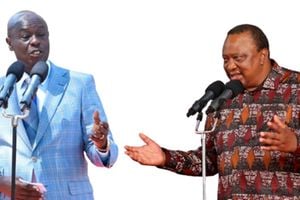Consumers pay Sh2.2bn ‘administrative cost’ in fuel subsidy scheme

Kenyans were forced to pay an extra Sh2.2 billion through higher fuel prices as “administration costs” of the fuel subsidy programme introduced in 2021.
Kenyans were forced to pay an extra Sh2.2 billion through higher fuel prices as “administration costs” of the fuel subsidy programme introduced in 2021 to prevent a steeper jump in fuel prices.
It is unclear what these costs entail, but Auditor-General Nancy Gathungu has found that there were no valid reasons for the government to include such charges in the price of fuel.
But what will frustrate consumers is that a programme that was aimed at lowering pump prices introduced an additional cost, which translated to a higher cost of goods and services such as transport and power.
“There was no just for including the stabilisation administration costs in the pump price buildup,” said Ms Gathungu in a fresh audit report that casts a further shadow of doubt on the opaque subsidy programme.
Former President Uhuru Kenyatta introduced the fuel subsidy programme in 2021 to cushion consumers from fuel prices, which had hit a historic high following the post-Covid-19 pandemic recovery period.
The Energy and Petroleum Regulatory Authority, which reviews fuel prices monthly, applied a subsidy on fuel for the first time in the April-May 2021 pricing cycle.
The subsidy came months after Kenya had enacted the Petroleum Development Levy Order No. 24, which came into effect in July 2020. The law raised the Petroleum Development Levy from Sh0.40 per litre to Sh5.40 to be put into a kitty that would help the government stabilise prices whenever prices spiked.
In the revelations by the Auditor-General, the government spent Sh139.14 billion on the fuel subsidy programme in the financial years 2020/21, 2021/22, and 2022/23.
Ms Gathungu further disclosed that Mr Kenyatta’s government went ahead to pay oil marketing companies (OMCs) an advance of Sh5.32 billion as reimbursement for fuel that they had.
A major problem of this advance payment to oil firms was that it was difficult to recover any money from them if they had sold fuel volumes less than the subsidy money received.
“There was no legal framework for advance payment and there was no evidence of recovery of this advance in subsequent payments to the oil marketing companies,” said Ms Gathungu.
The fuel subsidy programme was controversial from the beginning, with little information made public about the criteria used to reimburse OMCs and the paid amounts.
Further, because more money was required to undertake the programme than what was being collected through the Petroleum Development Levy, the government had to use taxpayers’ money to pay oil firms.
However, President William Ruto ended the fuel subsidy in mid-2023.





